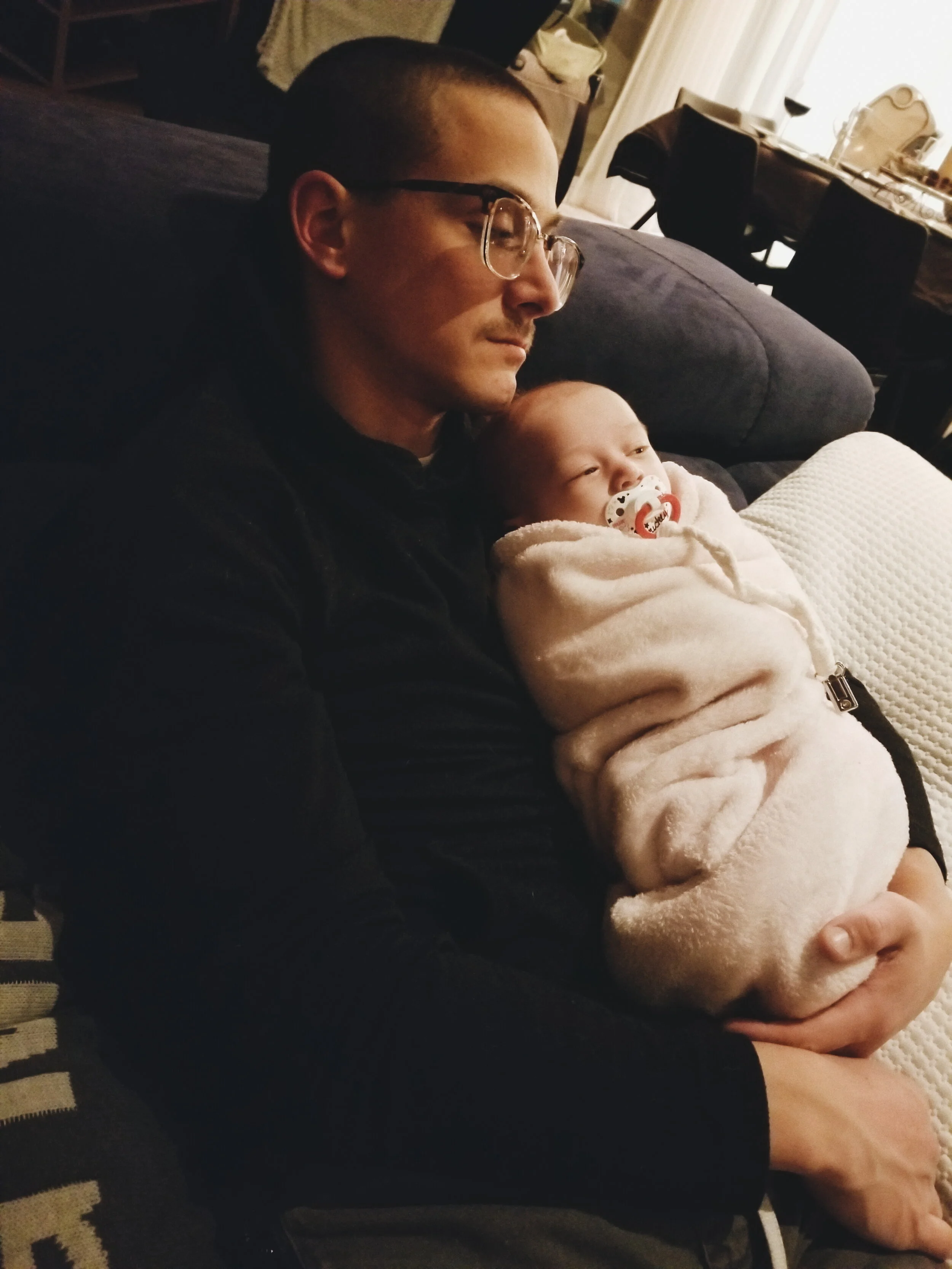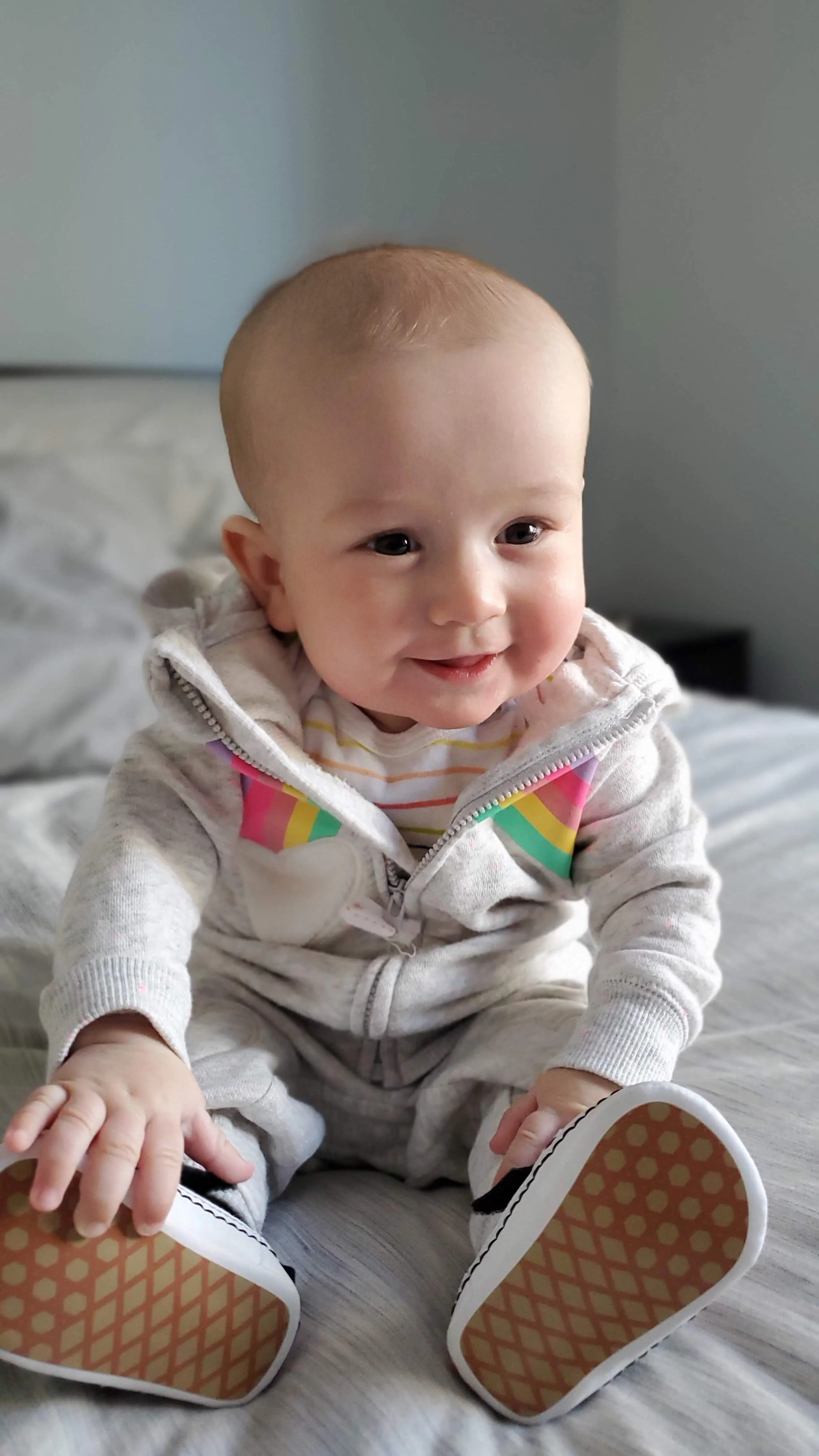Story #56 - Emma, Laval QC (Canada)
Exceptional times call for exceptional measures. COVID-19 might prohibit in-person interview, but not truthful and personal storytelling about postpartum life.
As of March 2020, every story that will appear on the site has been submitted by email or discussed over the phone. I hope they find a gentle way to your homes and bring you comfort and peace.
Love,
Ariane.
3:08 am. That was the answer to my immediate question as my doctor put my newborn daughter, Andie, on my chest for the first time: “what time is it?”. I don’t know why I even asked that, but after what felt like an eternity of pushing (three hours and eight minutes, to be exact), I needed to know.
My daughter was born slowly and not without help. I had a “plan,” a loose expectation of what I wanted, but I trusted my doctor and ultimately let him lead the way. I knew that he would respect my preferences but ultimately do what was best for Andie. I didn’t want to be induced -but twenty-two hours after my water breaking, I went forward with it. I didn’t really want an epidural, but five hours after induction, I caved and asked for it (and I’m damn happy I did). The days were inching by, and it felt like I would be in labor forever. We passed the time by googling famous birthdays as I watched my husband eat shish taouk (he may have snuck me a bite). It was a toss-up between Dr. Phil (that day, Sunday, September 1st) or Keanu Reeves (the following day, September 2nd). My doctor said it would be Dr. Phil. It was Keanu Reeves.
Midnight came, and it was time to push. My fever spiked around 1 am, and I was given antibiotics to stop the infection that was forming due to my water being broken for about thirty-four hours at this point. Her head was angled upwards, which made it hard to work her down. The antibiotics brought my contractions six to ten minutes apart, so I pushed slowly but vigorously as not to miss a fleeting contraction. We had to speed things up as we were both getting tired. After an episiotomy, a failed vacuum attempt, and a discussion about bringing out the forceps, she emerged in 3 pushes, the last one not even during a contraction. I was over it. I was ready. Just give me my damn baby, so I can rest (and EAT).
(Family photo)
As she lay on my chest, and my husband fed me muffins, my doctor stitched me up as we joked around and celebrated. She was here -little Andie Wilder. All seven pounds and seventeen inches of her.
The sun rose and set as usual, though time didn’t pass for us for the next few days. We swayed between a state of bliss and delirium. Nurses came in at all hours of the day and night, giving me antibiotics, checking my blood pressure (thank you, preeclampsia), massaging my uterus, and making sure Andie was eating. My self-care consisted of shoveling a cold hospital meal into my mouth, showers with my flip flops on (and one arm out of the shower to protect my catheter), and regular diaper changes and Lanacane on my aching parts. I was on a strict regimen of LaxaDay and Tylenol since I couldn’t take any painkillers due to my blood pressure. Nights were long. Breastfeeding was hard. I missed my bed and my dogs and my peace and quiet.
We were eventually sent home, and it felt like it would shift. Once we were back, it would settle in. This stranger I carried and gave birth to would make sense to me. I’d love her, and she’d love us, and we’d all bask in this little love bubble. This stage was supposed to be magical -the “newborn bubble.”
The bubble burst quickly. My peace and quiet were replaced by constant screams, sleepless nights, and chapped nipples. Still, there were good moments. We had an amazing lactation specialist come to the house, and our breastfeeding journey was taking off. We eventually got some four to five-hour sleep stretches. She was small and cute, and warm. Time passed, and we continued to drift through the days with a semblance of a routine.
Still, she screamed. Loud, piercing screams. She wriggled and cried and didn’t want to be held but didn’t want to be put down. She choked on her reflux and constantly gagged. “It’s colic; it’ll pass after three months!”. “It’s normal. Her digestive tract isn’t formed yet!”. I was stuck between feeling like maybe this was “normal” (though it didn’t feel that way) and like she was really in distress (but maybe I’m overreacting).
Anxiety came and broke our routine. My husband returned to work. We all cried a lot. Daily. Loudly and explosively or alone at 2 am under the stovetop light. The couch became my new bed. We spoke to each other in broken sentences between Andie’s crying fits. This became our new normal.
What sort of a mother leaves her child in this state? Clearly, something is wrong. Or maybe this is just normal. What do I know? What do I know about babies at all? But she’s my daughter, and I have this feeling… no. I just spend too much time on Google. I said I wouldn’t do that. Doctors seem intrigued but not that worried. But they will want to see her every two weeks. Wait, have the dogs been fed? Is dinner ready? Did I ask my husband how his day was? What day is it anyway? I wish I could sleep in bed with him. I miss him. I’m a pretty shitty wife. And my daughter is hysterical. I’m a pretty shitty mom.
And this became my new normal.
(Family photo)
The days and weeks passed, and four months came and went. We got used to our routine as Andie grew and changed and developed. She moved into her own room and had a few good nights. She reached for things and grabbed objects, and cooed. She smiled and giggled and full-on belly-laughed when her dad danced around her. We had good moments and difficult days. She was happy and energetic and angry and hysterical, and tearful. She was intense -that’s what we chalked it up to. Our love for her (and each other) grew. We ignored our mutual and personal anxieties and pushed through. We were parents, after all. Isn’t this how it’s supposed to be?
Andie’s four-month appointment came three weeks late, and the outcome wasn’t great. She was falling in her weight “curve,” and she was still visibly in a lot of pain. Her tummy was hard and often swollen. She hardly wanted to bend her legs and always wanted to be standing. She was not sleeping, and it was getting worse. I was back on the couch with her, and my husband and I were bursting at the seams.
“You might want to put her on hypoallergenic formula.” My heart sank in my chest. The one thing I felt confident in, the one thing that made me feel like a decent mother, was being put into question. If I didn’t breastfeed, what was all of this for? We had worked so hard to make this work.
I burst out in tears in the office. My doctor was compassionate and sweet. There was always the option of doing the “eviction diet” to rule out any intolerances, but it was going to be hard. I cried more in the car. And then I took the “hard road.” I trusted myself, for once. I knew that I was good enough for her -that nursing her was the right choice for us. That I had to follow my gut instinct. And that we both had to talk to someone about our anxiety.
(Family photo)
We’re six and a half months postpartum now. My husband is sitting on the floor with Andie and making farting noises, which always make her laugh. She sits on her own and can stand when she hangs on to something. She has favorite toys (interlocking rings, a Tupperware bowl, and her Sophie giraffe). She’s a happy baby that sometimes has fits. Our breastfeeding journey is still going strong, and she takes formula in her cereal. I can’t eat beef or soy, but milk and gluten are back on the menu, I’m okay with that, although I miss sushi and Oreos. She is sleep trained, and I’m back in bed with my husband. We laugh a lot.
There is no conclusion to be had here because this story is far from over. Every day we add a new chapter. All I know is that we’re in a good place right now. We follow our own rhythm and values. We talk to each other and our doctor and take our medication. We are stronger because of our fragility. We will likely fall and break again, but we are better equipped and more unified. And there is so much love. Always, always love.



